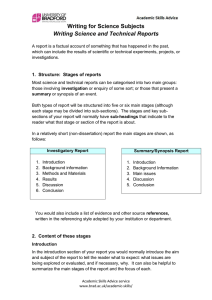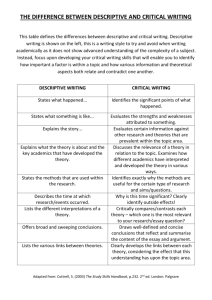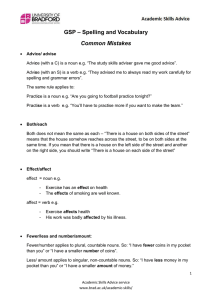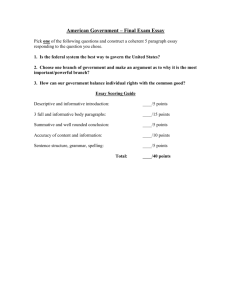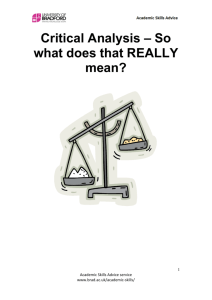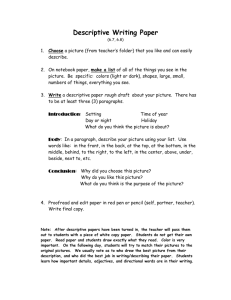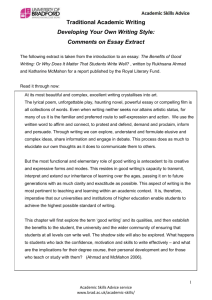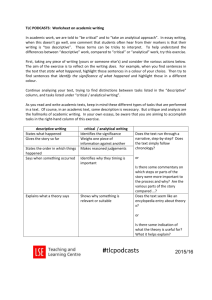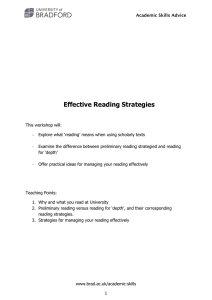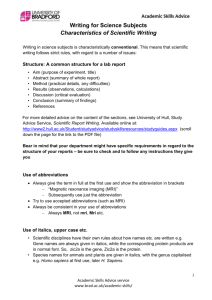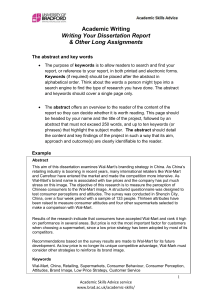Understanding
advertisement
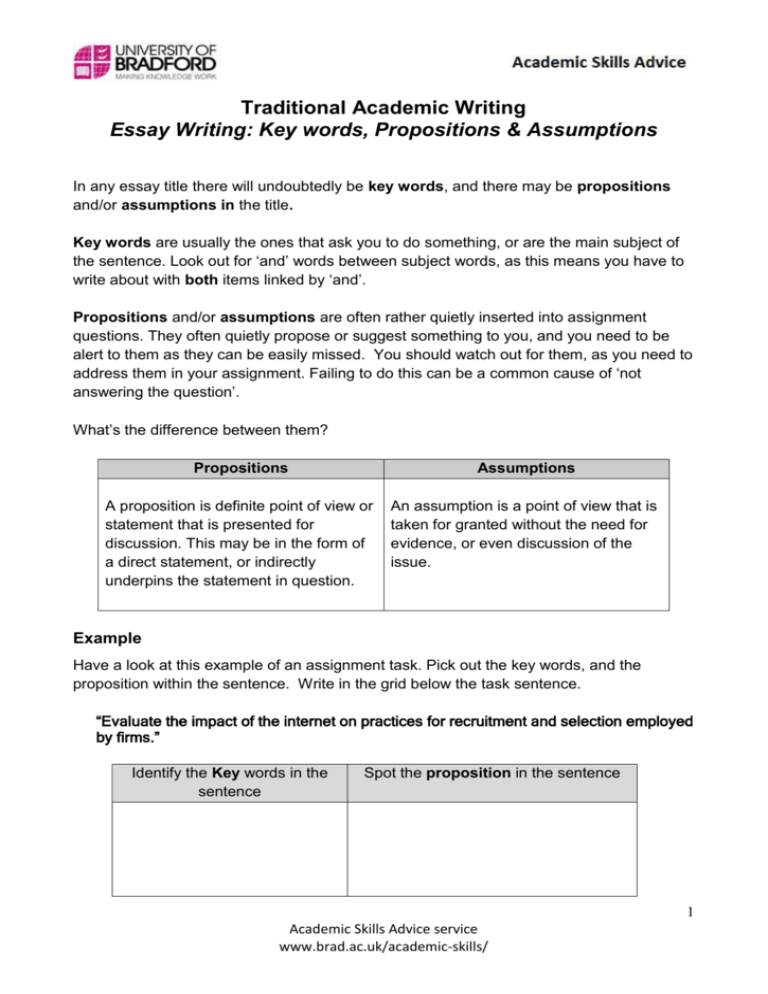
Traditional Academic Writing Essay Writing: Key words, Propositions & Assumptions In any essay title there will undoubtedly be key words, and there may be propositions and/or assumptions in the title. Key words are usually the ones that ask you to do something, or are the main subject of the sentence. Look out for ‘and’ words between subject words, as this means you have to write about with both items linked by ‘and’. Propositions and/or assumptions are often rather quietly inserted into assignment questions. They often quietly propose or suggest something to you, and you need to be alert to them as they can be easily missed. You should watch out for them, as you need to address them in your assignment. Failing to do this can be a common cause of ‘not answering the question’. What’s the difference between them? Propositions Assumptions A proposition is definite point of view or statement that is presented for discussion. This may be in the form of a direct statement, or indirectly underpins the statement in question. An assumption is a point of view that is taken for granted without the need for evidence, or even discussion of the issue. Example Have a look at this example of an assignment task. Pick out the key words, and the proposition within the sentence. Write in the grid below the task sentence. “Evaluate the impact of the internet on practices for recruitment and selection employed by firms.” Identify the Key words in the sentence Spot the proposition in the sentence 1 Academic Skills Advice service www.brad.ac.uk/academic-skills/ What type of question or task is it? Essay titles undoubtedly contain ‘command’ words. These command words can be broken into two main types; descriptive and analytical. Descriptive Analytical Descriptive assignment questions or tasks test your knowledge and understanding of a subject and your ability to present your ideas in a clear and organized way. You are expected to identify the component parts, main elements, and distinguishing features of any topic under discussion. Command words typically include: Classify Define Demonstrate Describe Explain Give an account of… Illustrate Outline Show how State Summarise Trace Analytical questions or tasks also test your knowledge of a subject. But they are more concerned with your ability to get below the surface of a subject and to examine it from different perspectives, understand arguments for and against, and if applicable propose alternative ideas, models, and practices. The command words typically include: Analyse Comment on Compare and contrast… Consider Criticize Discuss Distinguish between… Evaluate Interpret Justify It is possible to cluster these command terms into common meaning and action groups, as follows: Descriptive command groups Terms Describe State Tutor expectations You are expected to present the main features, elements, or components of the topic under discussion. The idea is to test of your awareness of the underpinning knowledge of any subject. 2 Academic Skills Advice service www.brad.ac.uk/academic-skills/ Demonstrate Illustrate Show how Outline Summarise Trace As above, plus you would be expected to give examples to show that you understand how something works, e.g. how a theory, model, idea or practice can be applied. You would clarify why something is as it is, or what happened in any given situation. Explain (try defining these yourself) (try defining this word yourself) Analytical command groups Terms Discuss Evaluate Consider Interpret Comment on Tutor expectations If you see any of these command terms you are expected to identify and explain the main features of the topic under discussion, including any main theories, ideas, models, or practices underpinning the topic. If applicable, you would be expected to know of and weigh-up any counter-arguments and to make connections between different ideas. Justify This involves a detailed scrutiny of the topic in question. This could include explaining one or more of the origins, structure, organization or development of the topic in question, and the positive and negative features of it. (try defining this word yourself) Compare and contrast… This involves a close study of the differences between one thing or situation and another. You would need to identify the structure and features of one and make comparisons with another. Analyze Criticize Distinguish between… If relevant to the assignment topic, you may be required to make a judgement on which is ‘better’ for the situation in question. An essay may involve: A descriptive only approach (fairly common at first stages of undergraduate study) Or Description and analysis: in this case, both are important, but it is the analysis part of your assignment that will carry the weight of the marking. 3 Academic Skills Advice service www.brad.ac.uk/academic-skills/ Exercise Evaluate this statement: “New technology is a significant contributory factor in weakening the ability of people to write well”. How would you tackle this question? 4 Academic Skills Advice service www.brad.ac.uk/academic-skills/
